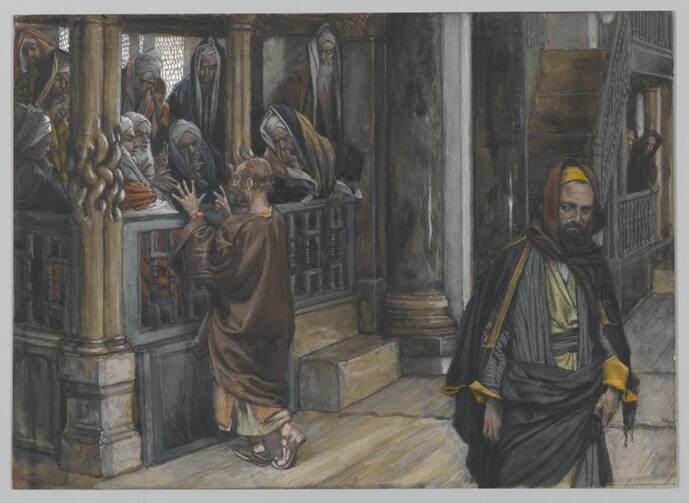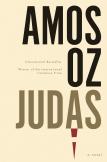Judas Iscariot: the first and last Christian?
I confess to having felt the occasional twinge of pity for Judas. He might easily have said, “Why me, Lord? Why did I have to become the worst person that ever lived?” Amos Oz actually goes beyond pity to make Judas a hero and martyr. A novel of ideas—religious, philosophical and political—Judas is so beautifully and simply told that I wished I could read Hebrew. With subtle irony and hints of magical realism, Judas is also the story of a young man’s coming of age in a cold and rainy Jerusalem in the late winter of 1959.
Three people—and two “ghosts”—live together in an old house on the outskirts of the city near an abandoned Arab village. The ancient stone house has a broken front step and a gate that can be neither fully opened nor completely closed, possibly a metaphor for Arab-Israeli relations; the Arabs cannot be fully welcomed, nor completely shut out. One of the three inhabitants is Shmuel Ash, a 20-something university drop-out, shy, asthmatic, easily moved to tears, who has left his home in Haifa with two rolled up posters, one of Fidel Castro and the other a reproduction of the “Pieta.” The second is Gershon Wald, a garrulous old Zionist intellectual to whom Shmuel is a paid companion. The third resident, Atalia Abravanel, a beautiful woman in her 40s, is Wald’s widowed daughter-in-law. Her husband, Wald’s son, brutally killed by Arabs in the 1948 War of Independence, is one of the “ghosts.” The other “ghost,” Atalia’s late father, Shealtiel Abravanel, suffered a political death in 1947 when his rejection of the Jewish state and his belief in Arab-Israeli friendship caused Israelis to label him a “traitor.” Abravanel did not believe in states. “Let us live here next to each other and among each other,” he said: “Jews and Arabs, Christians and Muslims, Druze and Circassians, Greeks and Latins and Armenians.”
“I love Israel, but I don’t like it very much” said Amos Oz in an interview in 2016 in The Guardian. It would be easy to love Abravanel’s country: “He loved the mountains of Galilee and the slopes of the valleys and the Carmel…. He loved Jerusalem and the desert and the little Arab villages on the coastal plain and in the foothills.” It would also be easy to dislike the same country, described by Abravanel as “given over to the worship of militarism, drunk on victory, and consumed by hollow chauvinistic euphoria.”
If Judas had not betrayed Jesus, Ash argues, there would have been no crucifixion and, therefore, no Christianity.
Ash is intrigued by Abravanel because he is obsessed by the idea of treachery. Wald, the atheist who likes nothing better than arguing on the telephone with “old enemies,” responds with amused sarcasm as Ash expounds on his two passions: a book he wants to write called Jewish Views of Jesus, stressing the fact that Jesus, always a Jew, never wanted to start a new religion; and the idea that Judas, who loved Jesus “much more” than he loved God, has always been misunderstood. If Judas had not betrayed Jesus, Ash argues, there would have been no crucifixion and, therefore, no Christianity. He even argues that the greatest betrayal of all time was really an effort to prove that Jesus was the Son of God. Judas was able to betray, Ash says, because he was sure that Jesus, astounding Jews and Romans alike, would climb down from the cross to announce the kingdom of heaven—when “love alone would rule the world.” But Jesus did not come down from the cross, and Judas loses everything he believed in, as well as the will to live. For Ash, Judas is “the first Christian. The last Christian. The only Christian.” If only the Jews had accepted Jesus, he argues, “the whole of history would have been different. There would never have been a Christian Church. And the whole of Europe might have adopted a milder, purer form of Judaism. And we would have been spared exile, persecutions, pogroms, the Inquisition, blood libels, and even the Holocaust.”
For Ash, Judas is 'the first Christian. The last Christian. The only Christian.'
A chapter is devoted to the post-crucifixion Judas, wracked with guilt, unable to escape the screams in his head of Jesus crying for his mother—not his father. “I murdered him,” Judas says to himself. “He did not want to go to Jerusalem and I dragged him there.” Although Jesus “knew from the outset the limits of his powers,” Judas believed that “death could not touch him.” Judas remembers that Jesus had cursed a fig tree for not bearing fruit. “Why did he curse the tree? Had he forgotten his own gospel and become full of cruelty and loathing?” Judas should have seen that, “after all, he was no more than flesh and blood like the rest of us. Greater than us, more wonderful than us, immeasurably deeper than all of us, but flesh and blood.” All that remains is for Judas to hang himself from a fig tree.
Meanwhile, the old man and the young man love to talk. Only the woman, who is mostly silent, has her feet on the ground. But Wald warns Ash not to fall in love with his daughter-in-law—as all his former paid companions have done. Yet Ash is fascinated by Atalia, who either ignores him or treats him with gentle mockery. He dreams of a love affair, but the most he can do in his shy clumsiness is mildly amuse her by making paper boats to sail across the kitchen table. “You’re not a young man,” she says. “You’re an old child.” When he is totally helpless, his leg in a cast from tripping over the broken front step, she finally seduces him—but does not allow him to speak and, tellingly, covers her father’s photograph. She does offer solace, however: “The city is full of girls…. You’re a tender-hearted generous boy. Girls love those qualities because they are so rare in men.”
At the end of the winter rains, Ash decides to leave Jerusalem. He had no idea where to go, but “felt that the opinions he had held since his youth were fading.” He cannot finish his Jewish Views of Jesus, because there was “no end to that story.” Leaving his posters of Fidel and the “Pieta”behind but taking his typewriter, he goes south by bus to one of the new towns to find his future. The landscape is familiar, between the natural beauty of ancient hills, vineyards and eucalyptus groves and the man-made ugliness of tract houses, ruined Arab villages and barbed wire. He sees a pretty young woman at a window. He wants to talk to her but, still shy, doesn’t know what to say. Ash faces the future without the baggage of youth. “And he stood wondering,” is the last line of the book.











